Yesterday I was making my post on institutional racism, and I thought of tackling another issue that is specifically relevant to neoGAF's interest in games. There's much talk about the issue of female depictions in games, but do the numbers reveal an issue exists? People in some corners like to deny there is a problem and adopt a "see no evil" approach, but in the great interest of "following where the facts lead, not where we wish them to go" I thought I'd do some research on exactly where things stand.
In this thread I encourage female members of the game industry to share their experiences in development or as gamers. I want others to introduce statistics they've found showing issues they believe to exist. Because of how politically charged this topic has become of late, I think it's important to show precisely what we're dealing with and why it's important to change this.
Note: This can go hand in hand with the type of portrayals of women in games, but since that's a bit more open to interpretation, I'm going to stick to what we definitely know. This is also not a #MEN-TOO thread. So don't.
____________________________________
A STATISTICAL PRIMER
____________________________________

● Percentage of Female Game developers is 22%; transgender/androgynous only 2%. This is up from 11% from 2009. Better, but still terrible.

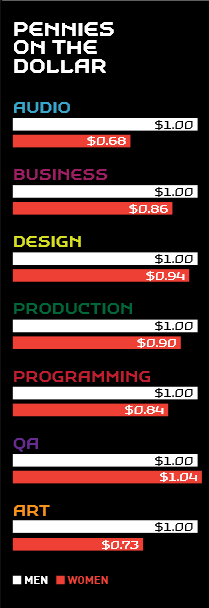
● Women in the game industry make an average of $12,192 less than men. They receive massively less pay in audio, art, programming, production. The only exception is QA. (Credit: Lime)

● Less than 12% of Computer Sciences Bachelor Degrees were awarded to women in survey from 2010-2011; this is down massively from 38% in 1984.

● Why did women stop coding? Because the Computer industry started targeting men/boys in Advertising. (Credit: marcurius)

● 52% of gamers in the UK are women. Persistent problem then shifts in trying to devalue the importance of mobile games as "real games." Except...
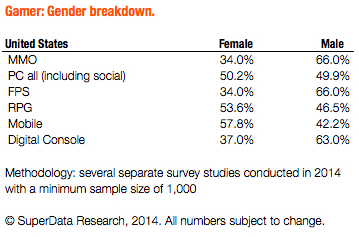
● Women compose 57.8% of mobile market, 53.6% of the RPG market, 34% of the FPS market, 50% of PC market including social.
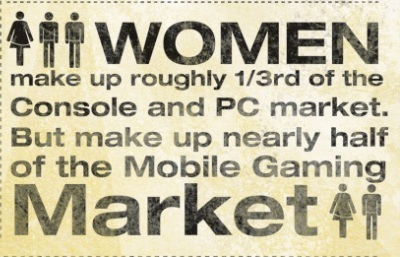
● ...Approximately 1/3rd of console and PC gamers are also women (Second Source: Gamasutra)

● Women face far more severe forms of harassment online, from stalking to rape threats
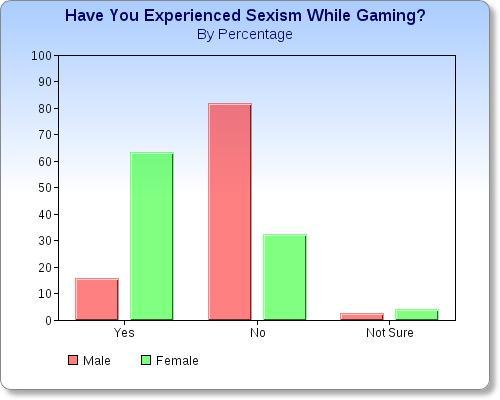
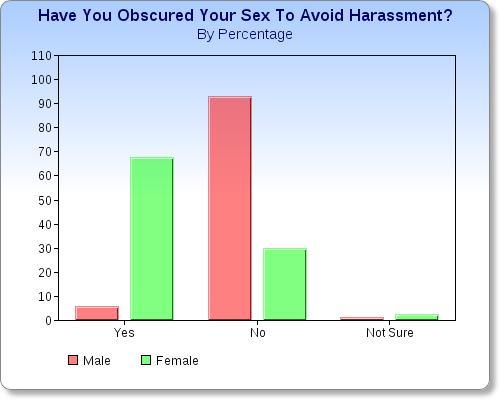
● Women far more likely to report being harassed, facing sexism, threats, etc.

● Only approximately 15% of all games have playable female protagonists
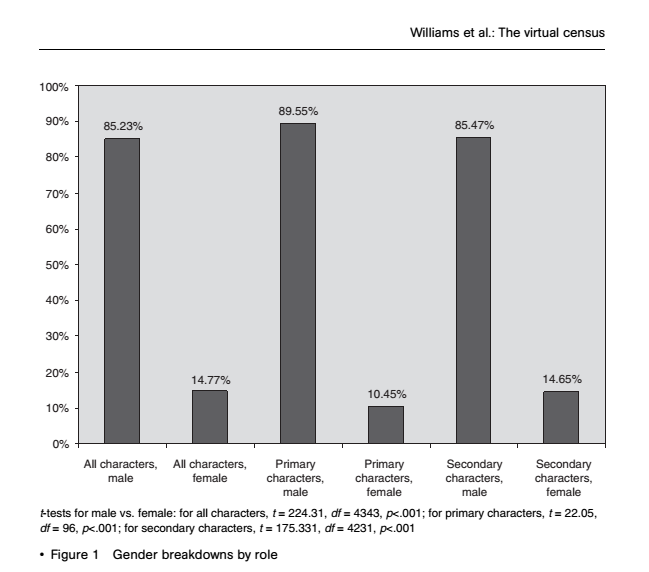
● Here is a great list of resource articles analyzing the inherent issues women are facing within the game industry. It's absolutely breathtakingly chronicled by neoGAFer Lime.
____________________________________
HOW DO WE CHANGE THIS?
____________________________________
I'm still collecting data and will be adding more to the OP over time. But for the moment, I think this is a good start.
I am not a female, obviously. But I think it's important to be able to untangle oneself from the position one has in life and look at the unvarnished truth of things. IF we accept the reality of statistics like those above, what does that mean? If women make up 52% of all gamers, and 1/3 of all console/PC gamers, why are only 15% of games featuring women leads? Why are only 22% of employees in the game industry women? Why are they paid so much less on average? Why are there so many fewer lead female game designers?
You don't have to be political to understand diversity of perspective in games is hugely important. It is vital to not just have the opinions of people who are vitally connected to the industry but those outside it to perhaps get a picture of what needs changing or what can be added or improved.
There is a great anecdote about how Rhythm Tengoku came to be. Tsunku, a well known Japanese record producer, songwriter and vocalist - and a videogame outsider - came to Nintendo with a proposal to make a game that did not rely on visual indicators for its gameplay. The result is one of the most highly rated rhythm game series in the industry, and one that is near universally loved.
Tsunku is not a female, but the point is the same: All manner of perspectives are vital to create an industry that meets ALL the idiosyncratic needs of players, including women. And if you have this massive number of female gamers and yet a huge gap in the number of female perspectives in the industry, the problem becomes clear.
There is often a lot of complaint from some corners as well about enforcing certain quotas for hiring. Another great anecdote comes from outside the game industry, where the showrunner of the comedy show COMMUNITY, Dan Harmon, was forced to maintain a 50/50 quota for female writers. At first, he hated it:
But then...
Game development is no different in terms of the importance of having diverse perspectives and what the impact can be when properly applied. I am sure this thread will share many of those stories, and I can't wait to read them.
But what do you guys think need to be done to start changing things? How would you go about it?
In this thread I encourage female members of the game industry to share their experiences in development or as gamers. I want others to introduce statistics they've found showing issues they believe to exist. Because of how politically charged this topic has become of late, I think it's important to show precisely what we're dealing with and why it's important to change this.
Note: This can go hand in hand with the type of portrayals of women in games, but since that's a bit more open to interpretation, I'm going to stick to what we definitely know. This is also not a #MEN-TOO thread. So don't.
____________________________________
A STATISTICAL PRIMER
____________________________________

● Percentage of Female Game developers is 22%; transgender/androgynous only 2%. This is up from 11% from 2009. Better, but still terrible.


● Women in the game industry make an average of $12,192 less than men. They receive massively less pay in audio, art, programming, production. The only exception is QA. (Credit: Lime)

● Less than 12% of Computer Sciences Bachelor Degrees were awarded to women in survey from 2010-2011; this is down massively from 38% in 1984.

● Why did women stop coding? Because the Computer industry started targeting men/boys in Advertising. (Credit: marcurius)

● 52% of gamers in the UK are women. Persistent problem then shifts in trying to devalue the importance of mobile games as "real games." Except...

● Women compose 57.8% of mobile market, 53.6% of the RPG market, 34% of the FPS market, 50% of PC market including social.

● ...Approximately 1/3rd of console and PC gamers are also women (Second Source: Gamasutra)

● Women face far more severe forms of harassment online, from stalking to rape threats


● Women far more likely to report being harassed, facing sexism, threats, etc.

● Only approximately 15% of all games have playable female protagonists

Lime said:● Beasley and Standley (2002): 13.74 percent of the 597 analyzed characters were female
● Haninger and Thompson (2004) also supported the notion of imbalance in gender representation by virtue of their sample pool having 72 out 81 playable male characters versus only 42 playable female characters
● Dill et al. (2005) found that 10 percent of their sampled digital game characters were female.
● Mou & Peng (2008) did a similar study in which both gender and race were analyzed across the 19 most popular games in 2008, where all leading characters were male with no leading female character
● Williams et al. (2009) showed that only 14.77 percent of all virtual characters in the 150 top selling digital games across all platforms in the U.S. were female
● Downs & Smith (2010) made comparable observations which showed that 14.3 percent of a sample pool of 489 virtual characters in 60 digital games were women
● Here is a great list of resource articles analyzing the inherent issues women are facing within the game industry. It's absolutely breathtakingly chronicled by neoGAFer Lime.
____________________________________
HOW DO WE CHANGE THIS?
____________________________________
I'm still collecting data and will be adding more to the OP over time. But for the moment, I think this is a good start.
I am not a female, obviously. But I think it's important to be able to untangle oneself from the position one has in life and look at the unvarnished truth of things. IF we accept the reality of statistics like those above, what does that mean? If women make up 52% of all gamers, and 1/3 of all console/PC gamers, why are only 15% of games featuring women leads? Why are only 22% of employees in the game industry women? Why are they paid so much less on average? Why are there so many fewer lead female game designers?
You don't have to be political to understand diversity of perspective in games is hugely important. It is vital to not just have the opinions of people who are vitally connected to the industry but those outside it to perhaps get a picture of what needs changing or what can be added or improved.
There is a great anecdote about how Rhythm Tengoku came to be. Tsunku, a well known Japanese record producer, songwriter and vocalist - and a videogame outsider - came to Nintendo with a proposal to make a game that did not rely on visual indicators for its gameplay. The result is one of the most highly rated rhythm game series in the industry, and one that is near universally loved.
Tsunku is not a female, but the point is the same: All manner of perspectives are vital to create an industry that meets ALL the idiosyncratic needs of players, including women. And if you have this massive number of female gamers and yet a huge gap in the number of female perspectives in the industry, the problem becomes clear.
There is often a lot of complaint from some corners as well about enforcing certain quotas for hiring. Another great anecdote comes from outside the game industry, where the showrunner of the comedy show COMMUNITY, Dan Harmon, was forced to maintain a 50/50 quota for female writers. At first, he hated it:
Dan Harmon said:I remember going, “Are you f*cking kidding me?” to myself. “Okay, I got a sitcom, and this is as far as you go,” because I’ve just been told that half of my staff needs to be a quota hire.
But then...
Dan Harmon said:Now you have a staff that is just as good as the staff you would have had, but happens to be half women. And it seems like the greatest thing in the world, because the world is half women. And the male writers across the board, from top to bottom, in their most private moments drinking with me, when they’re fully licensed to be as misogynist, reactive, old-boy-network as they want, all they can say is, “This turned out to be a great thing.”
I don’t have enough control groups to compare it to, but there’s just something nice about feeling like your writers’ room represents your ensemble a little more accurately, represents the way the world turns.
Even though Bromstad’s gone, now I’m carrying this legacy, going, “Eh, guys, we really need a half-female writing staff.” I would teach it. I think we have to stop thinking of it as a quota thing and think of it as a common-sense thing.
Game development is no different in terms of the importance of having diverse perspectives and what the impact can be when properly applied. I am sure this thread will share many of those stories, and I can't wait to read them.
But what do you guys think need to be done to start changing things? How would you go about it?
